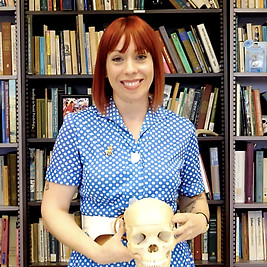

About us
We are a few of the faculty members in the Anthropology Department at California State University Dominguez Hills and we are all about providing exciting research and educational opportunities for our students. As professional anthropologists and archaeologists, we know how important it is to involve our students in our field research. Through participation in fieldwork, students not only get firsthand opportunities to develop their research and communication skills, but also experience indelible cross-cultural interactions that help them become global citizens.
Dr. Sarah Lacy
Biological Anthropologist, Archaeologist
Dr. Lacy’s research explores differential frequencies of caries, periodontal disease, and antemortem tooth loss in Neandertals and early modern humans across Europe and Southwest Asia, in the context of their prevalences among recent humans. Oral diseases documented via visual, microscopic and radiographic methods reveal more than just oral health, but also information about overall health, diet, environment, and disease susceptibility in an individual as well as broader demographic interpretations. Exploring a health problem documented in early humans, and thus providing a deep time evolutionary perspective, helps to contextualize what is known about oral health today including the origins of differential global health. Her latest project will take this research perspective to the final and post-glacial period of Europe to look at the relationship between climatic instability, diet, oral health, and population mobility. These research expertises translate to teaching interests in biological anthropology, human health and evolution, and human-environment interactions.


Dr. Ken Seligson
Archaeologist
Dr. Seligson is an anthropological archaeologist studying human-environment relationships in the northern Maya lowlands of the Yucatan Peninsula. Specifically, his research focuses on understanding changing human-environmental relationships and resource management practices in the hilly Puuc region of the Yucatan. Over the past ten years, he has had the good fortune of being able to conduct his field investigations as a member of the Bolonchen Regional Archaeological Project (BRAP) based out of the town of Oxkutzcab. One of the things that he enjoys most about his research is bringing students to the field for hands-on learning opportunities and new cultural experiences.
Dr. Sarah Taylor
Cultural Anthropologist
Dr. Taylor's ongoing research foci include the relationship between social position and land use decisions made at the household level, participatory research design, and the shifting economic strategies employed by residents as they negotiate the arrival of tourism in their daily lives. Her research began in the Maya village of Ek'Balam, Yucatan in 2004 and since then she has spent more than 24 months in the village conducting ethnographic research. More recently, her interests have shifted to include the role that traditional ecological knowledge plays in community-based tourism development and to explore the potentials for participatory research design and visual documentation in data collection.
